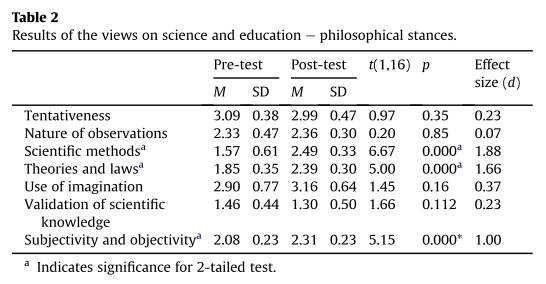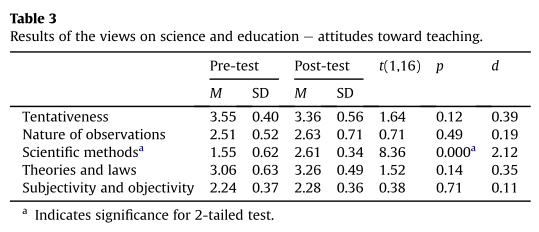Developed by Sufen Chen
| Purpose |
To be a valid, meaningful, and practical instrument for creating in-depth profiles of the views of college students or adults, including pre- and in-service teachers, about the nature of science, and NOS instruction.
|
|---|---|
| Format | Pre/post, Multiple-choice, Agree/disagree |
| Duration | 15 min |
| Focus | Beliefs / Attitudes (nature of science, theories and laws, tentativeness, creativity, objectivity, subjectivity, scientific method, teaching the nature of science) |
| Level | Upper-level, Intermediate, Intro college, High school |
Sample question from the VOSE:
When two different theories arise to explain the same phenomenon (e.g., fossils of dinosaurs), will scientists accept the two theories at the same time?
| A. Yes, because scientists still cannot objectively tell which one is better; therefore, they will accept both tentatively. | SD | D | U | A | SA |
| B. Yes, because the two theories may provide explanations from different perspectives, there is no right or wrong. | SD | D | U | A | SA |
| C. No, because scientists tend to accept the theory they are more familiar with. | SD | D | U | A | SA |
| D. No, because scientists tend to accept the simpler theories and avoid complex theories. | SD | D | U | A | SA |
| E. No, the academic status of each theory proposer will influence scientists’ acceptance of the theory. | SD | D | U | A | SA |
| F. No, scientists tend to accept new theories which deviate less from the contemporary core scientific theory. | SD | D | U | A | SA |
| G. No, scientists use intuition to make judgments. | SD | D | U | A | SA |
| H. No, because there is only one truth, scientists will not accept any theory before distinguishing which is best. | SD | D | U | A | SA |
more details
This is the second highest level of research validation, corresponding to at least 5 of the validation categories below.
Research Validation Summary
Based on Research Into:
- Student thinking
Studied Using:
- Student interviews
- Expert review
- Appropriate statistical analysis
Research Conducted:
- At multiple institutions
- By multiple research groups
- Peer-reviewed publication
The VOSE Likert-scale questions were developed based on questions from the VOSTS. An initial version of the VOSE was given to 14 American and 10 Taiwanese pre-service teachers, who were all interviewed about their responses. The survey questions were substantially revised, and the “draft VOSE” was created. It was given to 120 biology students in Taiwan, and further revised to ensure variation across respondents and to reduce the rate of neutral responses. The VOSE underwent expert review and further student interviews and was again revised. The VOSE was written and tested in Chinese and translated into English. The VOSE has been used with over 300 students in multiple majors at two Taiwanese universities and results published in two journal publications.
References
- S. Chen, Development of an Instrument to Assess Views on Nature of Science and Attitudes Toward Teaching Science, Sci. Educ. 90 (5), 803 (2006).
- E. Peters Burton, Student work products as a teaching tool for nature of science pedagogical knowledge: A professional development project with in-service secondary science teachers, Teaching Teacher Education 29 (1), 156 (2012).
PhysPort provides translations of assessments as a service to our users, but does not endorse the accuracy or validity of translations. Assessments validated for one language and culture may not be valid for other languages and cultures.
| Language | Translator(s) | |
|---|---|---|
| Chinese | Sufen Chen |
If you know of a translation that we don't have yet, or if you would like to translate this assessment, please contact us!
| Typical Results |
|---|
Typical scores on the VOSE from (Burton 2013)
|
The latest version of the VOSE, released in 2006, is version 1. Several pilot versions were tested starting in 2000 before creating this version.





